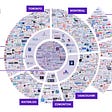If you don’t deliver, you’re not coming in.
Each week, we’ll distill industry and expert intel on a particular topic.
The only thing that’s consistent and predictable at the moment is change.
At Fluxx, we’ve been observing how people are responding to the current climate, monitoring emerging themes and tracking changes across industries. It’s clear that the pandemic has affected businesses in very different ways. Of course demand in many instances is at the forefront. But it’s not just demand that impacts whether a business can survive and thrive, it’s a business’s ability to adapt which is key.
Take the food industry for example, there have been notable shifts in how we approach food, from what we consume and where we consume it, to how it’s being produced and made available to us. One thing is for sure, lack of demand is not the issue. The pandemic has exposed the ‘broken’ global supply chain and triggered severe imbalances in supply and demand.
Adaptability is key.
Today, large parts of the food industry are broken. Many businesses have been left with huge inventory surpluses due to the collapse in hospitality and food services, unable to repurpose commercially grown food. Some farms are destroying their crops with no way to get their food off the farm and into stores. Whilst others are scouring the market to try to keep up with demand.
Forced into a situation no-one could have planned for, it’s those with the right foundations in place to adapt, flex and respond quickly that are coming out stronger; finding creative ways to reach customers and fulfill demand. So whether it is scaling up fulfillment and delivery, adopting new distribution channels, developing new partnerships or repurposing supply chains, and manufacturing, there is lots we can learn from responsive businesses as we start to see a new normal take shape. Here are some of the trends, behaviour and changes we’re seeing:
The direct-to-consumer market has flourished.
Normal distribution channels have collapsed for many businesses, forcing them to get creative. One of the UK’s largest start-up communities, Young Foodies, has launched its own direct-to-consumer platform, Mighty Small, bringing together thousands of small brands to help them reach consumers. In some instances we’re even seeing farmers change their offering to more direct-to-consumer deliveries and pickups to avoid the risk of losing their crop.
Supply chains are localised.
Already we are seeing more advanced supply chain optimisation as businesses look for cost saving ways to distribute their products. Local butcher shops are taking orders from whole streets via whatsapp communities and offering free delivery. Whilst others are bundling deliveries from different businesses to the same households and streets in order to reduce delivery costs. Pedalme, a bicycle delivery service has adapted its offering to create Pedal Me Supermarket, ‘free delivery of artisan products by small local businesses direct to your door’, in an attempt to help small London businesses survive.
A low touch economy has emerged.
What if your business is based on a physical experience and close contact interaction? According to the Board of Innovation the Low Touch Economy has emerged, and is here to stay. In order to survive in this new normal, restaurants, food and retail businesses must switch to delivery if they haven’t already and focus on a remote-first offering. People will expect take out, and home delivery everything. And we will most likely see an increase in specialist delivery offerings including drop off points for frozen food. Whole Foods Market have converted their stores into hubs for e-commerce and logistics, creating local dark fulfilment centres to keep up with demand.
It’s also having an impact on our consumption behaviour, and we think these isolation-induced changes are likely to stay and become ingrained habits in the new post COVID world:
The weekly shop is back.
Many have reverted to shopping like they did a decade ago due to social distancing measures, limiting their shopping to one per week. According to Tesco CEO Dave Lewis, transactions in April halved, but the amount bought doubled as consumers reintroduced the weekly ritual of a trip to the supermarket. Post-covid, people will maintain this practice of shopping less frequently; buying more long-life, store cupboard staples and frozen food in greater quantities each time they go shopping.
So is the local greengrocer, baker and butcher…
Driven by concerns of food and economic insecurity, long queues and busy crowds, many consumers have turned away from supermarkets towards small and local businesses. A recent study found 2 in 5 consumers have chosen to use local, independent shops more since lockdown. Coupled with a desire to support local sourcing and back businesses operating in their communities, we are seeing the resurgence of the greengrocer, baker and butcher.
Eating like Popeye.
Even before the pandemic consumers were becoming a lot more health conscious but coronavirus has accelerated consumers’ awareness of the importance of a healthy immune system. Now, a growing number are eating for strength; seeking out immune-boosting products. And as consumers look to maintain and enhance their health, demand for these immune-boosting products will continue to grow.
Whether all of these changes are permanent is still unclear. It is likely however that the coronavirus crisis will reshape the global food supply chains as companies look to reduce their dependence on complex international chains. Instead focusing on regional supply chains that offer greater resilience and flexibility. And as the new state of our economy and society is altered, our new normal will be characterised by low-touch interactions, increased health and safety measures alongside new human behaviours.
Natalia Walters is a consultant at Fluxx. Stay tuned with all that’s Fluxx by following us on LinkedIn or signing up for our WTF Newsletter.
Are you curious as to how Fluxx has helped companies such as Condé Nast, Mars, Thames Water, HSBC, Addison Lee Group and many more? Learn the secrets for sustained, repeatable innovation models, from expert practitioners. Get in touch now Natalia.Walters@Fluxx.uk.com. Equally, if you have any thoughts on the piece above, I’d love to hear from you!





